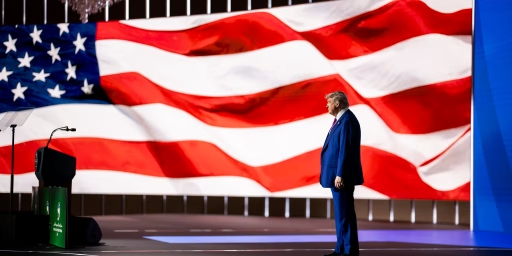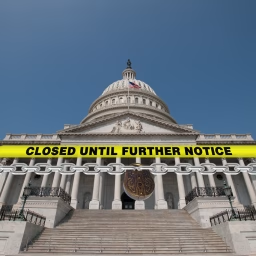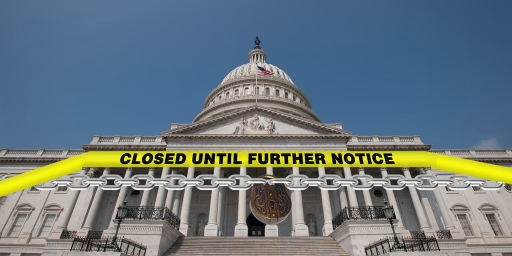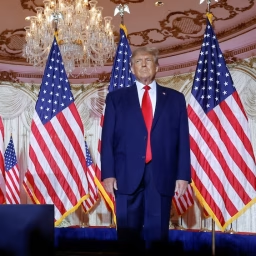
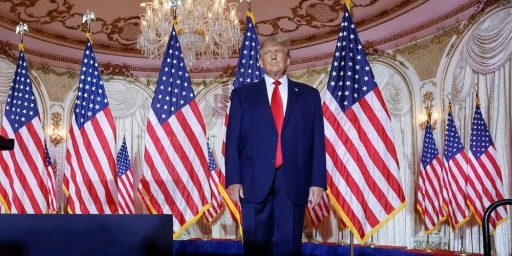
President-Elect Trump Pushing For Recess Appointments
In which I agree with Trump about the problem, but NOT the solution


Hitting Russia Where It Hurts
Sanctions are already taking a toll. But the West could do more if it had the will.
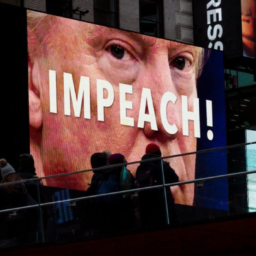
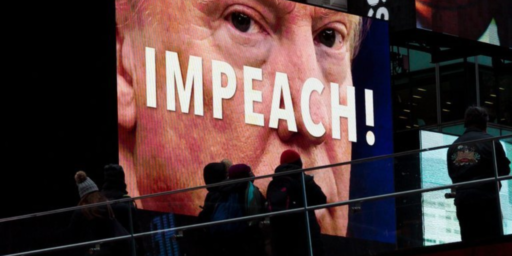
Impeachment Polling Largely Steady After Hearings
After two weeks of hearings, public opinion has not moved very much on the impeachment of the President.


The Filibuster’s Inevitable Demise
Senate Republicans are pushing for the end of minority obstruction—and the Democrats can’t wait.
The Merrick Garland Precedent and the Kennedy Vacancy
The unconscionable violation of norms in 2016 won’t apply in 2018; it’s a matter of power, not principle.
Associate Justice Anthony Kennedy Announces Retirement
After thirty years on the bench, during which he played a central role in some of the Supreme Court’s most significant rulings, Justice Anthony Kennedy is retiring.
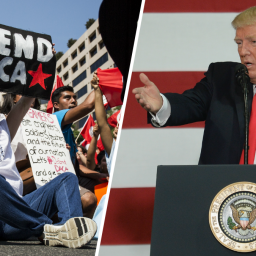
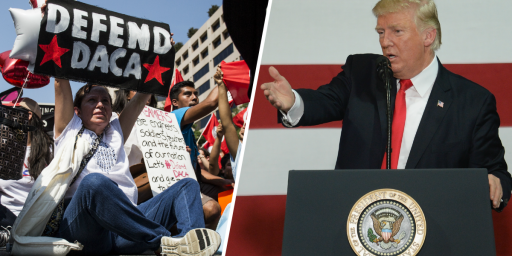
Ranting On Twitter, Trump Says “No More DACA Deal”
In a bizarre Twitter rant, President Trump declared a DACA deal “dead,” blaming Democrats when it’s clear that it’s largely his fault.
Donald Trump Has Already Undermined Any Talks With North Korea
By threatening to withdraw from the nuclear deal with Iran, Donald Trump is making it far less likely that any upcoming talks with North Korea will succeed.


Trump Calls On Senate GOP Go Nuclear On Filibuster. That’s Not Going To Happen
President Trump called on Senate Republicans to eliminate the legislative filibuster to resolve the government shutdown. That’s not going to happen.
Anthony Kennedy Drops A Big Hint About Potential Retirement in 2018
Justice Kennedy is telling prospective law clerks for the term that beings in October 2018 that he is considering retiring at the end of the term that begins this October.


Trump Drops Demand For Border Wall Funding As Congress Tries To Avoid Government Shutdown
With a government shutdown looming at the end of the week, the Administration has appeared to back away from a demand that a government funding bill include money allocated for the President’s promised border wall.
Another Supreme Court Vacancy This Summer?
The Chairman of the Senate Judiciary Committee is hinting at a new Supreme Court vacancy this summer.

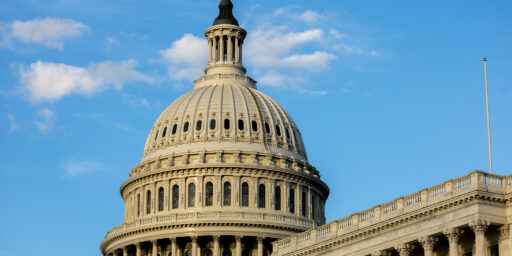
On the History of the Filibuster
Stop romanticizing the filibuster (and don’t appeal to the intent of the Founders).


Neil Gorsuch Confirmed As 113th Justice Of The Supreme Court
After a prolonged vacancy and a bitterly partisan confirmation process, Neil Gorsuch has been confirmed to succeed Antonin Scalia on the Supreme Court of the United States.
Senate Invokes ‘Nuclear Option’ As Gorsuch Nomination Heads To Final Vote
As expected, Senate Republicans invoked the so-called ‘nuclear option’ to move the nomination of Judge Neil Gorsuch forward to a final vote on Friday.
Senate Committee Advances Gorsuch Nomination As ‘Nuclear Option’ Becomes Inevitable
The Senate Judiciary Committee voted to advance the nomination of Judge Neil Gorsuch even as it became inevitable that Republicans would be forced to invoke the ‘nuclear option’ to confirm him to the Supreme Court.
Senate Headed For ‘Nuclear Option’ Showdown Over Gorsuch Nomination
Next week’s big news is likely to be the Senate’s vote to confirm Neil Gorsuch to the Supreme Court, which could mean invocation of the so-called ‘nuclear option’ by Senate Republicans.


Gorsuch Has Another Good Day In Front Of Senate Judiciary Committee
More fireworks on the second day of the questioning of Neil Gorsuch, but his confirmation nonetheless seems assured.


With Gorsuch Hearings Set To Begin, It’s Democrats Who Are In The Hot Seat
Judge Neil Gorsuch’s confirmation hearings begin Monday morning, but it’s Senate Democrats who are in the hot seat.
Senate Democrats Split On Strategy For Gorsuch Nomination
Senate Democrats are divided on how to approach the nomination of Judge Neil Gorsuch to the Supreme Court, making it likely that he’ll be confirmed.


Jeff Sessions Confirmed As Attorney General
After a highly contentious nomination process, Jeff Sessions was confirmed last night as the new Attorney General of the United States.


How Should Democrats Respond To The Gorsuch Nomination?
In the end, an effort by Democrats to block Neil Gorsuch’s nomination to the Supreme Court does not seem like a good use of their rather limited options.


Trump’s First Supreme Court Pick Could Be Days Away
President Trump hinted today that he’s likely to name his Supreme Court choice next week, and the list to appears have narrowed to three men.


New Senate Democratic Leader Regrets Supporting Filibuster Reform
The new leader of the Senate’s Democrats says he regrets supporting the filibuster reforms his party passed in 2013.


Key Republican Senators Come Out Against Elimination Of The Filibuster
Senior Republican Senators are throwing cold water on the idea of eliminating the filibuster.


John McCain Says Republicans Will Refuse To Confirm Any Clinton SCOTUS Nominee
John McCain said that Senate Republicans will unite to block any Supreme Court appointment by a President Hillary Clinton.


After Final Senate Vote Fails, The Iran Nuclear Agreement Is A Done Deal
The final effort to block the Iran Nuclear Deal failed in the Senate yesterday, meaning that the deal will now move forward.


Republicans Suddenly Discover They’re Against The Filibuster
Now that they control all of Congress, some Republicans are suddenly deciding that the filibuster should be repealed.
Republican Senators Split On Whether To Reinstate Old Filibuster Rules
The GOP Senate Caucus seems to be split on whether or not to reinstate the filibuster for Presidential and Judicial appointments.


Obama ‘Outpacing’ Bush on Judicial Confirmations
President Obama has gotten more federal judges confirmed at every level than his predecessor had at this point.


Mark Herring Declared Winner Of Virginia Attorney General’s Race, But It’s Far From Over
We have a certified “winner” in the Virginia Attorney General’s race, but where it heads from here is still up in the air.


Political Impact Of Filibuster Changes Will Be Minimal To Non-Existent
Yesterday’s change to the filibuster rule is likely to have little impact outside the beltway and the political chattering class.


Senate Goes (Partly) Nuclear, Limits Filibusters For Some Nominees
It wasn’t a Thermonuclear move, more like something the size of Hiroshima, but today the Senate took an historic move nonetheless.


Will Another Senate Showdown Over Filibusters Lead To The ‘Nuclear Option’?
After the GOP blocked a series of Obama judicial nominees, Democrats are again threatening to go nuclear on filibuster reform.
Senate Nears Deal That Kicks The Can Down The Road, Accomplishes Little Else
The deal emerging out of the talks between Senator Reid and Senator McConnell is about what you’d expect, but it’s probably the best we can expect right now.
Are There Too Many Positions Requiring Senate Confirmation?
There are over 1,000 Executive Branch positions requiring Senate approval. That seems excessive.


Harry Reid Backs Away From The Nuclear Option, Filibuster Alive And Well
Once again, the threat of the “nuclear option” appears to have had less megatonnage than some expected and others hoped.


Could Today Be The Day Harry Reid Goes Nuclear? [Update: Tentative Deal Reached]
The Senate may be headed for an historic confrontation today if an 11th hour deal isn’t reached.
Due Process When Everything Is A Crime
Glenn Reynolds has an interesting piece out today in the Columbia Law Review.


In Challenge To Senate GOP, Obama Names Three Judges To D.C. Circuit
President Obama threw down a gauntlet today in the form of a trio of Judicial nominations.

